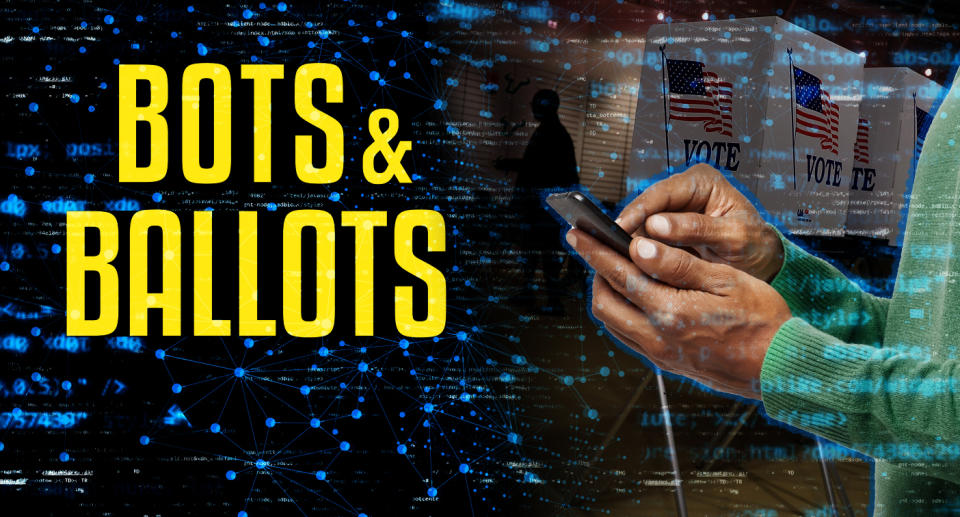Blockchain voting too risky, cybersecurity expert says
SAN FRANCISCO — The future of voting should not involve your cellphone, according to a leading cybersecurity expert.
In a first-of-its-kind pilot program, West Virginia will test blockchain encrypted mobile phone voting for members of the U.S. military. But Joe Hall, chief technologist and director of internet architecture at the Center for Democracy & Technology, warned that the plan presents a host of risks.
“West Virginia has taken the ridiculous step of deciding that they’re going to not only vote on a mobile device, which in and of itself is just a bad idea, but use a blockchain mechanism, something associated with crypto-currency or bitcoin,” Hall told Grant Burningham, host of the Yahoo News podcast “Bots & Ballots.”
In a September interview with Burningham, venture capitalist Bradley Tusk argued that his foundation’s plan to test cellphone voting was a way to boost voter participation in the U.S. However, Hall believes the risks outweigh the possible benefits.

“They’re not the thing you want to use for voting in public elections for a few different reasons. One is you’re voting on the internet. You’re fundamentally sending electronic ballot information over the internet to some other system,” Hall said. “The phones we use, the desktop computers we use, the networks in between them, the servers on the other side, every single one of those things is fundamentally insecure.”
At the Center for Democracy & Technology, a nonprofit that fights for online civil rights, Hall has worked on projects ranging from helping computer scientists create unbiased algorithms to advocating for online privacy and freedom of expression. He believes that there’s already enough evidence to dismiss the idea that our technology is secure enough to experiment with casting ballots over cellphones.
Download or subscribe on iTunes: “Bots & Ballots” by Yahoo News
“People say, ‘Hey, I can bank online; why can’t I vote online?’ Banks have enormous budgets for fraud,” Hall said. “If 10 percent of your transactions go wrong or are fraudulently captured, you can buy insurance, you can make people whole, you can plan for that. If 10 percent of ballots disappear or are modified without detection before they end up somewhere, we can’t accept that whatsoever.”
Hall argues that any cryptographic system will eventually be vulnerable to hacking and that our current platforms will be vulnerable within a couple of decades.
“There will be quantum computers within 20 years — a pretty good estimation — that will be able to instantly get through most of the crypto we use right now,” Hall said.
If that happens, Hall said, virtually all online activities, including how a person votes, would be made transparent.
“To put this in perspective, I’ll say it would be really unfortunate if an overseas Marine cast a ballot and is really happy to cast a ballot in the 2018 midterm election in West Virginia using this app,” Hall said. “It would be really unfortunate if in 20 years you’d be able to walk up to that soldier and say, ‘Hey, is this how you voted in the 2018 midterms?’ That’s just unacceptable to me.”
_____
More “Bots & Ballots” episodes from Yahoo News:
Former Obama official: U.S. ‘very vulnerable’ to power grid attack from Russia
Rand Paul and Dana Rohrabacher are doing Russia’s bidding, Bill Browder says
Facebook accused of conservative bias over Kavanaugh article fact-check
Smartphone voting could revolutionize American politics, venture capitalist says
Hillary Clinton adviser: We didn’t recognize ‘full scope’ of Russian interference on social media
Why Obama didn’t act on Russian election interference benefiting Trump
House Intel Dem: Trump collusion with Russia ‘well established’
Facebook is ‘a surveillance system,’ author Cory Doctorow says
Meet the man behind the new, pro-Trump Russian website in the U.S.
Ex-NSA official: Russian hack of Democrats was ‘assembly-line operation’
Ex-Twitter exec: Trump is in denial over social media threat to midterms
How Trump weaponized fake news — and changed the rules for fact checkers
Bots are poised to wreak havoc on the 2018 midterm elections



